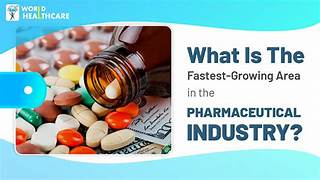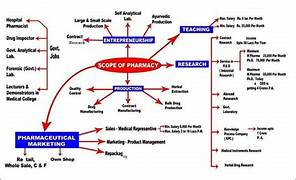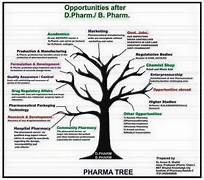A Career in B. Pharma: Opportunities, Challenges, and Growth
Introduction
The pharmaceutical industry is one of the fastest-growing sectors in the world, playing a critical role in the healthcare system. As the demand for skilled professionals in drug development, manufacturing, and healthcare increases, the Bachelor of Pharmacy (B. Pharma) degree has gained significant popularity. This blog explores the key aspects of pursuing a B. Pharma degree, career opportunities, challenges, and the potential for growth in the pharmaceutical industry.
What is B. Pharma?
The Bachelor of Pharmacy (B. Pharma) is a four-year undergraduate degree program that provides in-depth knowledge of pharmaceuticals, medicinal chemistry, pharmacology, and pharmaceutical engineering. The curriculum is designed to equip students with the necessary skills to understand drug compositions, manufacturing processes, therapeutic effects, and regulations governing the pharmaceutical industry.
Why Choose B. Pharma?
1.Growing Healthcare Industry: The global pharmaceutical market is expanding rapidly due to the increased demand for innovative drugs and treatments. This growth creates a constant need for trained pharmacists and professionals who can contribute to research, development, and distribution of medicines.
2. Diverse Career Opportunities: A B. Pharma degree opens doors to various career paths, such as:
- Pharmaceutical Industry: Research and development, drug manufacturing, quality control, and regulatory affairs.
- Healthcare: Hospital or clinical pharmacy, community pharmacy, and consulting.
- Entrepreneurship: Starting your own pharmacy or becoming a pharmaceutical distributor.
- Academia and Research: Opportunities to work in teaching or pursue advanced research in pharmaceutical sciences.
3. Contribution to Public Health: Pharmacists play a crucial role in ensuring the safe and effective use of medicines. By pursuing a career in pharmacy, you can directly impact public health and contribute to improving the quality of life.
Challenges in B. Pharma
1. Intensive Coursework: The B. Pharma curriculum is rigorous, covering a wide range of subjects including organic chemistry, pharmacology, pharmaceutics, and biochemistry. Students need to stay dedicated and put in consistent efforts to excel.
2. Practical Experience: While theoretical knowledge is essential, practical experience is equally important in pharmacy. Students often face challenges in gaining hands-on training in laboratories and through internships.
3. Regulatory Compliance: Pharmacists and pharmaceutical companies must adhere to strict regulatory standards set by authorities like the FDA, WHO, or local drug control boards. This can be a complex and challenging aspect of the job.
4. Continuous Learning: The pharmaceutical field is ever-evolving, with new drugs, therapies, and regulations emerging regularly. Pharmacists must stay updated through continuous education and professional development to remain competitive.
Career Prospects After B. Pharma
1. Pharmacist: Graduates can work in hospitals, clinics, or community pharmacies where they dispense medications, advise patients on their use, and collaborate with healthcare providers.
2. Pharmaceutical Researcher: Many B. Pharma graduates work in research and development (R&D) to develop new drugs and improve existing treatments.
3. Quality Control/Quality Assurance: B. Pharma graduates ensure that pharmaceutical products meet safety, quality, and efficacy standards during the production process.
4. Regulatory Affairs Specialist: These professionals ensure that companies comply with all the laws and regulations governing the pharmaceutical industry, especially during drug approval processes.
5. Medical Representative: Graduates can work as representatives for pharmaceutical companies, promoting products to healthcare professionals.
6.Further Studies: B. Pharma graduates can pursue higher education, such as a Master of Pharmacy (M. Pharma) or Doctor of Pharmacy (PharmD), to enhance their career prospects.
Future Growth in the Pharmaceutical Industry
The pharmaceutical industry is projected to grow due to advancements in biotechnology, personalized medicine, and an aging population. Key trends such as the development of biosimilars, orphan drugs, and digital health solutions are creating new opportunities for pharmacy professionals.
Conclusion
Pursuing a B. Pharma degree offers a rewarding career with diverse opportunities in healthcare, industry, and research. Although the path may be challenging, with dedication and continuous learning, a career in pharmacy promises growth, job stability, and the chance to make a meaningful impact on society. Whether you aspire to be a pharmacist, researcher, or entrepreneur, B. Pharma can be the stepping stone to achieving your goals in the pharmaceutical world.





















